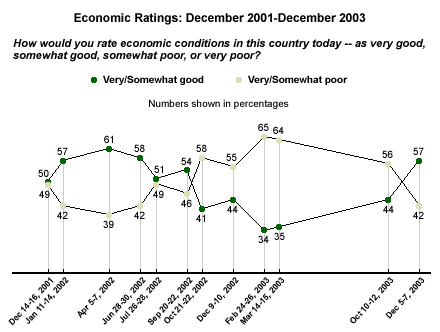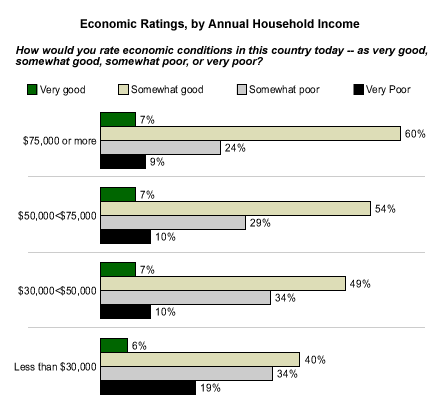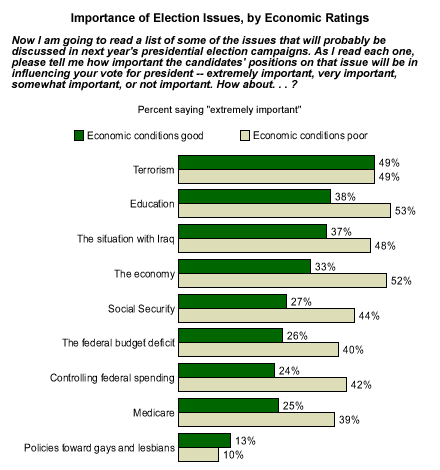There's an old saying that aptly describes the theory behind "trickle-down" economics: "A rising tide raises all boats." Given the growing consensus that the U.S. economy will continue to surge ahead in early 2004, the trickle-down theory suggests that economic conditions should be improving for everyone.
A Dec. 5-7 CNN/USA Today/Gallup poll*, however, suggests otherwise -- at least when it comes to public perceptions at this point in the economic recovery. Gallup data show that higher-income Americans currently see a much better economy than their lower-income counterparts do. Not surprisingly, those with higher incomes are also more optimistic about economic conditions next year.
It appears as though structural economic change is overwhelming the traditional benefits associated with the trickle-down theory. The growing economy is not having its traditional positive impact on the jobs and wages of lower-income Americans. Instead, many wage earners continue to experience the layoffs and wage compression normally associated with a recession. As a result, the "poor" economy -- not the "strong" recovery -- continues to be an extremely important issue for many voters as they look to next year's elections. And the economy may become even more important as a political issue if the capture of Saddam Hussein eases Americans' concerns about the war in Iraq.
More Americans Rate the Economy as Good
Fifty-seven percent of the public rates current economic conditions as "somewhat" or "very" good -- up from 44% in October. The current percentage is also up from the 44% who gave good ratings to the economy in December 2002, and the 50% who did so in December 2001. Still, even after the recent surge in economic growth, 42% of Americans continue to rate the economy as "somewhat" or "very" poor.

Higher-Income Americans Are More Positive
Americans' ratings of the economy vary significantly according to their income. Roughly two in three Americans with annual household incomes of $75,000 a year or more rate current economic conditions as somewhat or very good. In contrast, less than half of those with incomes of less than $30,000 a year rate the current economy as good.

The Economy Remains an Extremely Important Issue for Many
In the Dec. 5-7 poll, Gallup provided respondents with a list of political issues and asked them how important the candidates' positions on each one will be in determining their vote. Four in 10 Americans say that the candidates' positions on the economy will be extremely important in influencing their votes for president. More significantly, half of those who rate current economic conditions as poor say the economy will be extremely important to how they vote, while only a third of those who rate the economy as good feel this way. Of course, there are plenty of American voters whose views of the economy will not be their only prominent consideration. For example, about half of Americans tell Gallup that their opinion on who would best combat terrorism will also be extremely important to how they vote next year, regardless of whether they rate the current economy as good or poor.

A Stealth Issue for 2004
Many observers feel that strong economic growth in early 2004 will neutralize the economy as a political issue in next year's election. However, public opinion data suggest that this may not be the case. The data show that the structural changes taking place in the U.S. economy, and their impact on jobs growth in the United States, could well be a "stealth" issue in the election.
The politically sensitive nature of these structural economic changes -- namely, the importance of jobs over economic growth -- revealed itself when the Bureau of Labor Statistics revised the employment data in October. With the apparent uptick in the number of jobs created, the whole character of the current economic recovery seemed to change overnight. A month later, this employment optimism bubble burst as November employment growth didn't sustain the momentum of the October hiring revisions.
Bottom Line
Productivity-driven economic growth will not neutralize the economy as a political issue if it does not trickle down from Wall Street to Main Street. In fact, economic growth could do just the reverse, making economic change an even bigger issue among some segments of the electorate in 2004.
*Results are based on telephone interviews with 1,004 national adults, aged 18 and older, conducted Dec. 5-7, 2003. For results based on these total samples, one can say with 95% confidence that the margin of sampling error is ±3 percentage points.
